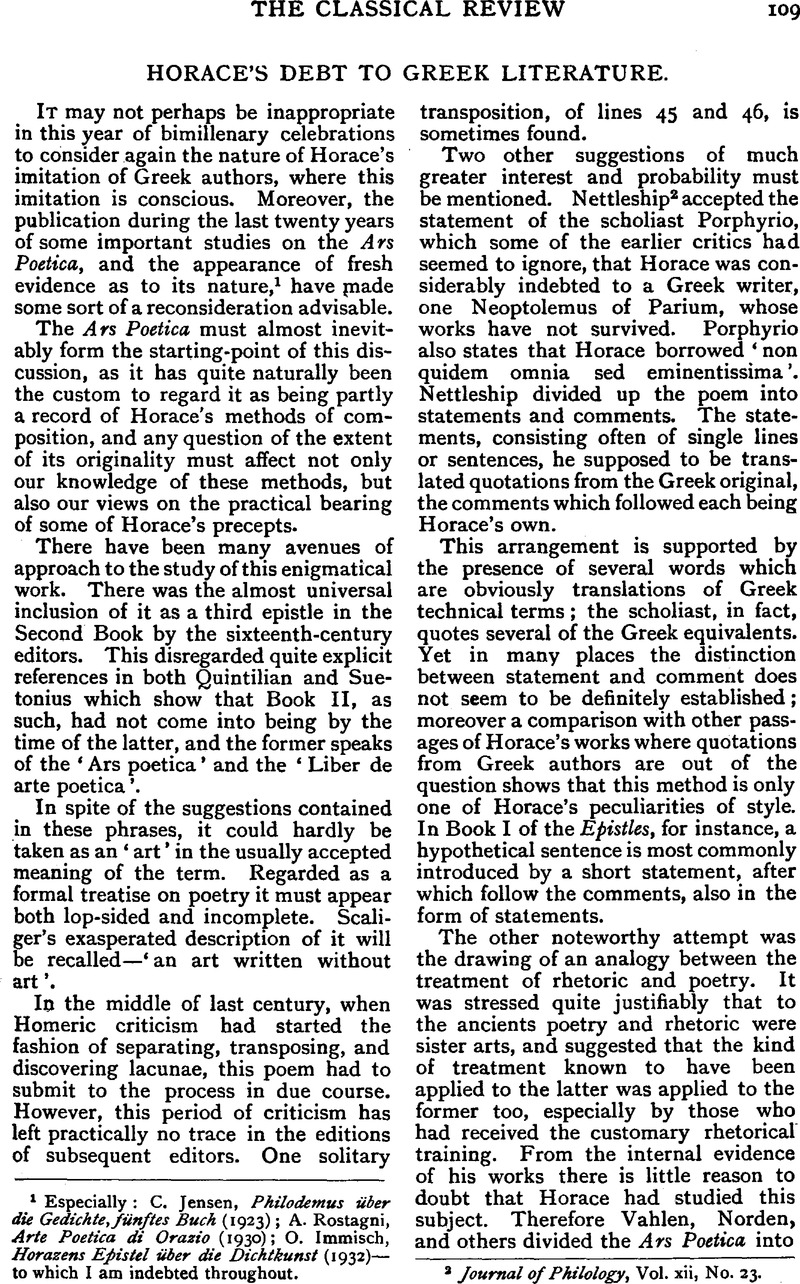No CrossRef data available.
Article contents
Horace' Debt to Greek Literature
Published online by Cambridge University Press: 27 October 2009
Abstract

- Type
- Review Article
- Information
- Copyright
- Copyright © The Classical Association 1935
References
page 109 note 1 Especially: Jensen, C., Philodemus über die Gedichte, fünftes Buch (1923)Google Scholar; Rostagni, A., Arte Poetica di Orazio (1930)Google Scholar; Immisch, O., Horazens Epistel über die Dichtkunst (1932)– to which I am indebted throughout.Google Scholar
page 109 note 2 Journal of Philology, Vol. xii, No. 23.
page 110 note 1 Some of his arguments were, however, demolished by Mommsen.
page 110 note 2 Sat. I, 2, 121.
page 110 note 3 Though not all the letters of the name are legible, the restoration seems certain.
page 110 note 4 Col. XIII, 8.
page 110 note 5 A.P. 343.
page 110 note 6 1, 2, 3.
page 110 note 7 A.P. 100.
page 110 note 8 E.g. ‘praenotio’ for πρόληΨις.N.D., I, 17, 44.
page 110 note 9 Col. I, 32.
page 111 note 1 E.g. in A.P. 408.
page 111 note 2 A.P. 338; see also 317.
page 111 note 3 A.P. 310.
page 111 note 4 A.P. 319–322.
page 111 note 5 I.e. accepting the distinction usually drawn by Greek grammarians that ποίημα is the whole of a long poem and ποίημα a part of it; see Marx on Lucilius IX, 338.
page 112 note 1 Rostagni and Immisch do indeed differ as to the point of division between ποίησις and ποίημα. Rostagni assigns I-41 to ποίησις, Immisch 1–152. The division between ποίημα and ποιμτής is quite clear, and both start this section with 295.
page 112 note 2 A.P. 25.
page 112 note 3 A.P. 335.
page 112 note 4 E.g. the portrayal of the differences between various kinds of Greeks and barbarians: A.P. 118:
page 112 note 5 Cicero, De Oratore, II, 177.
page 112 note 6 A.P. 135.
page 113 note 1 Horace: a New Interpretation, p. 246.
page 113 note 2 A.P. 224.
page 113 note 3 A.P. 268.
page 113 note 4 A.P. 286.
page 114 note 1 Supported by Michaelis and Nettleship.
page 114 note 2 These seem to be overlooked by Professor Jefferson Elmore, who assigns it to 28 or 27 B.C. in Classical Philology XXX, p. I.
page 114 note 3 Ep. I, 1, 18.
page 114 note 4 A.P. 73 seq.
page 114 note 5 Ep. I, 19, 23.
page 114 note 6 Od. Ill, 30, 13, and Ep. I, 19, 32.
page 114 note 7 A.P. 38.
page 114 note 8 v. 60.
page 114 note 9 Sat. I, 10, 19.
page 115 note 1 Cat. li.
page 115 note 2 A.P. 133–135.
page 115 note 3 Od. II, 16, 5.
page 115 note 4 Od. III, 9, 7.
page 115 note 5 A.P. 53.
page 115 note 6 Sat. I, 10, 31.
page 116 note 1 Sat. I, 4, 1 seq.
page 116 note 2 A.P. 281.
page 116 note 3 A.P. 47.
page 116 note 4 A.P. 52.
page 116 note 5 A.P. 86 and 119 seq.
page 116 note 6 A.P. 129 seq.
page 116 note 7 A.P. 132.




